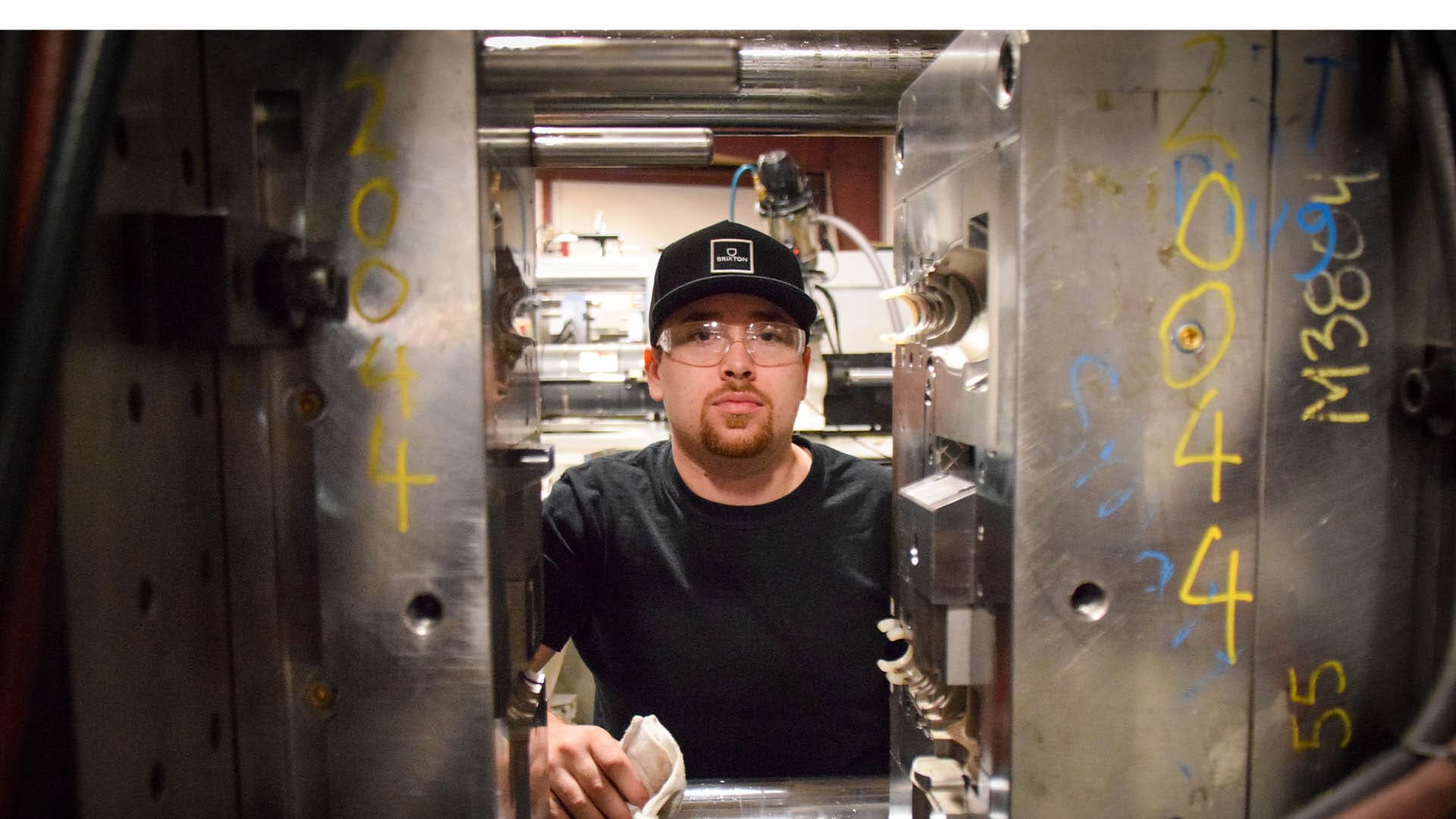*This is a Washington State average for this occupation. Wage rates vary by employer, industry, experience and location.
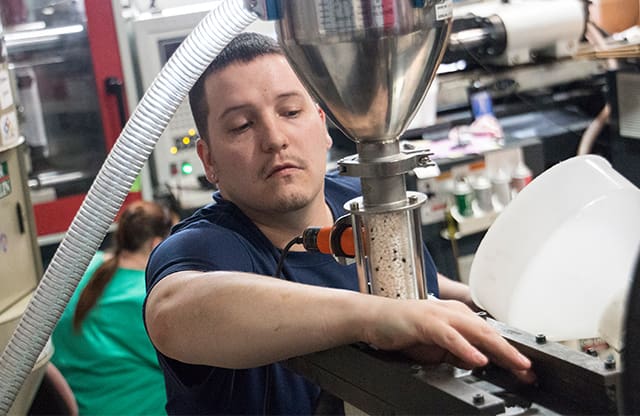
What is a Plastic Process Technician?
A Plastic Process Technicians primary job is to set up, monitor and troubleshoot plastic injection-molding machines. This requires specialized knowledge of materials, specific tools, and equipment. Troubleshooting tasks might include dealing with inconsistent material, faulty equipment, human error, and preventing defects from occurring.
Plastic Process Technicians:
- Ensure injection molding machines, auxiliary equipment, and connected automated systems are set to regulation parameters, meet quality standards and all production goals.
- Set up and start up molding machines, read blueprints, and check products with calipers, optical comparators, and other testing methods and devices.
- Provide feedback on mold design and assist tool and die makers to dial in each mold for optimal cycle time and quality.
- Monitor and troubleshoot processing problems, perform preventive maintenance tasks, and document process changes.
- Are able to apply all aspects of scientific molding.
- Understand the importance of reducing and reusing material scrap to protect our environment and save costs.
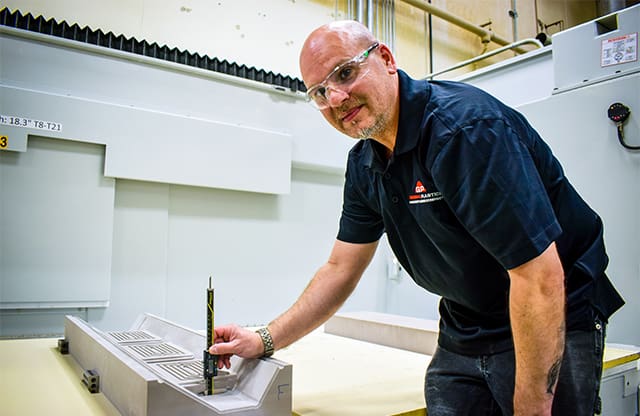
What are the Benefits of Becoming a Plastic Process Technician?
Plastic Process Technician is an advanced apprenticeship occupation that reinforces machining, maintenance, and troubleshooting skills.
Upon completion of a Plastic Process Technician apprenticeship, you will receive a nationally-recognized journey-level credential and can move onto more advanced occupations such as mechanical engineering, maintenance manager, or industrial engineering.
As a Plastic Process Technician, you will enjoy a long-term career with a good salary, job advancement opportunities, and the chance to work with your hands and cutting-edge technology.
Steps to Becoming an Apprentice


6 Steps to Becoming an Apprentice
Get Hired by a Participating Employer AJAC Partners With
Receive Participation Approval from Your Employer
Sign an Apprenticeship Agreement with AJAC
Enroll in AJAC’s Apprenticeship Classes Each Quarter
Log and Submit Your OJT Hours Monthly
Receive a Nationally-Recognized Journey-Level Certification from L&I
How Much Can I Earn?
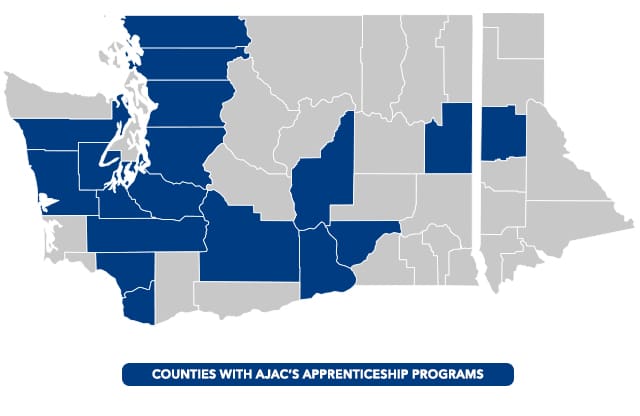
Where Will I Work?
AJAC has partnered with 300+ advanced manufacturers to provide supervised, structured, paid on-the-job training.
AJAC apprentices can only work for companies that agree to hire them and place them into the program.
Each company has their own methodology for who they select as an apprentice.
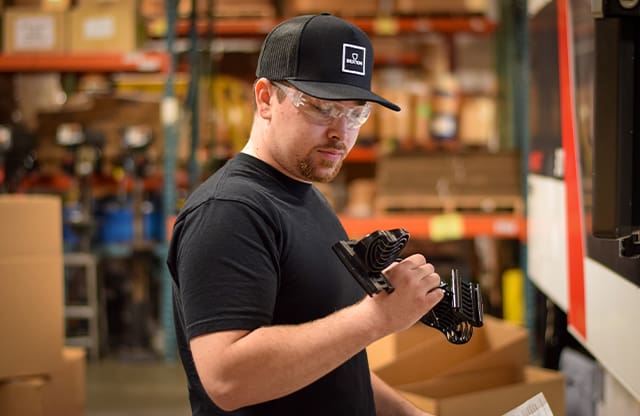
Where Are Classes Held?
Classes are held one night a week, typically on a Tuesday, Wednesday, or Thursday from 5:00 pm to 9:00 pm.
AJAC’s apprenticeships classes are structured for both online learning or in-person learning. Depending on the specific class you are taking, you may be required to complete it online or in-person.
In-person classes are held either a local community/technical college, high school, or skills center.
Apprenticeship Classes
Plastic Process Technician apprentices take 9 college-level classes. Each class consists of 50 hours of lecture and/or practical application. Upon completion of each class, apprentices will receive 5 college credits.
As a registered apprentice, you automatically receive 50% reduced tuition. Over half of AJAC’s partnering employers elect to pay for their apprentice’s tuition, making the entire apprenticeship free-of-cost.
Currently, each class costs $380 out-of-pocket.
Review of basic arithmetic, basic algebra application, based on geometry, right angle trigonometry, oblique angle trigonometry, and right angles.
Learn to read and interpret engineering drawings and schematics, as well as practice basic drafting. Drawings studied in this class will come both from the text and from industry, and will include machining, fabrication, assemblies, and fluid power systems (only for Automation/Maintenance program).
Measuring and inspection of size, position, form, surface finish and orientation.
Apprentices will study the theory and application of the use of standard tolerances and GD&T concentrating on geometric dimensioning and its relation to engineering drawings.
In this course, apprentices will learn about industrial electrical theory, components, and equipment necessary to troubleshoot electrical problems. Apprentices will begin by learning to interpret electrical symbols, diagrams, and terminology.
Learn to maintain all of the elements of a mechanical system. Apprentices will begin by exploring mechanical fundamentals such energy, mechanical forces, and simple machines. Apprentices will learn to troubleshoot, assemble, and maintain couplings, gears, pulleys, chains, sprockets, and brakes.
Apprentices will explore the fundamentals of fluid power systems, including structures and components, operation, safety, as well as interpreting related standards, symbols, and diagrams. Hydraulic fluid types, properties, handling, and maintenance topics will be covered.
Plastics processing apprentices will explore material science and processing principles for polymer materials. Apprentices will learn about the chemical composition, structure, and material properties of polymers, and how polymer materials are modified to achieve desired properties.
Exploration of the materials, processes, and mold design principles for injection molding, compression molding, transfer molding, and die casting.
On-the-Job Training Competencies
The table below is a schedule of tasks and hours designed as a guide. The 6,000 hours will be completed over the course of the apprenticeship. The apprentice shall be instructed and trained in all operations and methods customarily used on the various machines. Each company will adhere to the schedule as closely as facilities will permit in order to provide the apprentice with well-rounded experience and practice on all relevant equipment and processes in the shop.
| OJT Competency | Approx. OJT Hours |
|---|---|
| Mold Setting & Process Set Up | 700 |
| Material Handling | 600 |
| Molding Machine Maintenance | 300 |
| Tool Maintenance | 300 |
| Safety | 100 |
| Quality Systems & Inspection | 500 |
| Assembly Equipment Operation & Bench Work | 500 |
| Process Development & Documentation (Molding) | 3,000 |
| TOTAL HOURS | 6,000 |
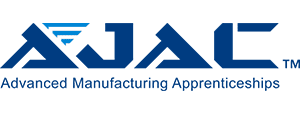
Launch Your Career Today!
Submit your information using the link below. After we receive your information, an AJAC representative will contact you for next steps. Please note, this is not an official application to become an apprentice. After a partnering employers agrees to enroll you in the program, you will officially apply and enroll at that time.
